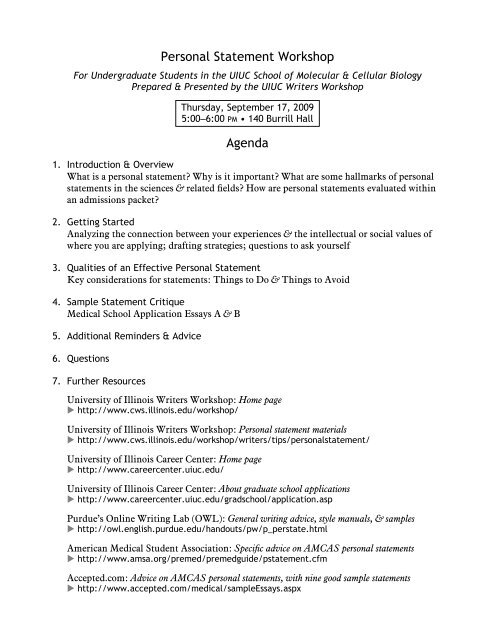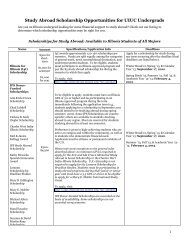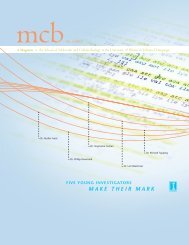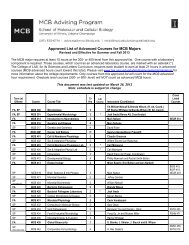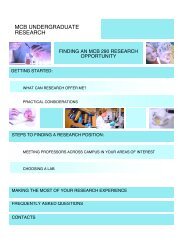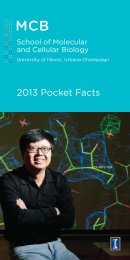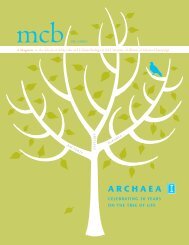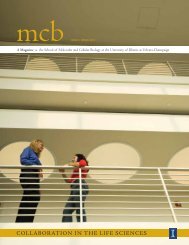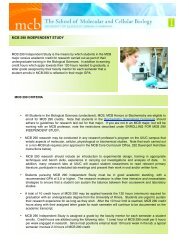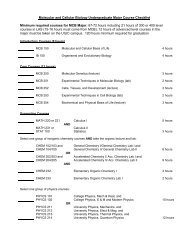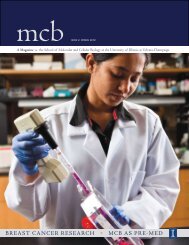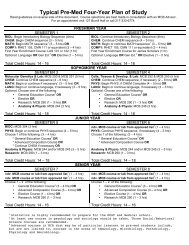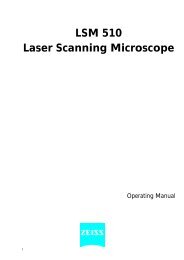MCB Personal Statement Workshop 17 Sep 09 - The School of ...
MCB Personal Statement Workshop 17 Sep 09 - The School of ...
MCB Personal Statement Workshop 17 Sep 09 - The School of ...
- No tags were found...
Create successful ePaper yourself
Turn your PDF publications into a flip-book with our unique Google optimized e-Paper software.
UIUC Writers <strong>Workshop</strong> • <strong>MCB</strong> <strong>Personal</strong> <strong>Statement</strong> <strong>Workshop</strong> Handout<strong>Sep</strong>tember <strong>17</strong>, 20<strong>09</strong> • Page 2One Process for Writing the <strong>Personal</strong> <strong>Statement</strong>1. Analyze the question(s) asked on each specic application. (See AMCAS 2010 Instructions,pp. 77–78.)2. Research the school and/or program to which you are applying.3. Take a personal inventory (see below). Write out a 2–3 sentence response to each question.4. Write a preliminary draft <strong>of</strong> your essay.5. Revise your essay for form and content.6. Ask someone else—preferably a faculty member in your area—to read your essay and makesuggestions for further revision.7. Revise again.8. Pro<strong>of</strong>read carefully.<strong>Personal</strong> Inventory Questions• What makes you unique (or at least different from any other applicant)?• What attracts you to your chosen career? What do you expect to get out <strong>of</strong> it?• When did you initially become interested in this career? How has this interest developed?When did you become certain that this is what you wanted to do? What solidied your decision?• What are your intellectual inuences? What writers, books, artists, pr<strong>of</strong>essors, scientists,theories, or concepts discovered in college (or elsewhere) have especially shaped you?• How has your undergraduate academic experience prepared you for graduate/pr<strong>of</strong>essionalschool?• What are two or three <strong>of</strong> the academic accomplishments which have most prepared you?• What research have you conducted? What did you learn from it?• What non-academic experiences (work, volunteer activities, family, etc.) contributed toyour choice <strong>of</strong> school and/or career?• Do you have specic career plans? How does graduate or pr<strong>of</strong>essional school pertain tothem?• How much more education are you interested in?• What’s the most important thing the admissions committee should know about you?• Think <strong>of</strong> a pr<strong>of</strong>essor you know in your eld whom you like and respect. If this person werereading your application essay, what would most impress him or her?
UIUC Writers <strong>Workshop</strong> • <strong>MCB</strong> <strong>Personal</strong> <strong>Statement</strong> <strong>Workshop</strong> Handout<strong>Sep</strong>tember <strong>17</strong>, 20<strong>09</strong> • Page 3When Writing Your <strong>Personal</strong> <strong>Statement</strong>s, You Should:• Answer all the questions asked.If you are applying to more than one program, you may nd that each application asks adifferent question or set <strong>of</strong> questions, and that you don’t really feel like writing a bunch <strong>of</strong>different responses. However, you should avoid the temptation to submit the same “generic”essay response for different applications: Tailoring your response to each question andeach school is far better, if you have the opportunity to do so.If you do nd yourself short on time and must tailor one basic essay to t a number <strong>of</strong> differentquestions from a number <strong>of</strong> different schools, target your essay to your rst-choiceschool, and keep in mind that the less your essay is suited to an application’s particularquestions, the more you may be jeopardizing your chances <strong>of</strong> being admitted to that school.• Be honest and condent in your statements.Use positive emphasis. Do not try to hide, make excuses for, or lie about your weaknesses.In some cases you may need to explain a weak component <strong>of</strong> your application, but in othercases it may be better not to mention those weaknesses at all. In either case, write an essaythat focuses on your strengths.• Write a coherent and interesting essay.Make your rst paragraph the best paragraph in your essay.• Develop a thesis about yourself early in the essay and argue it throughout.Each piece <strong>of</strong> information you give about yourself in the essay should somehow supportyour thesis.• Pick two to four main topics for a one-page essay.Don’t summarize your entire life. Don’t include needless details that take space away froma discussion <strong>of</strong> your pr<strong>of</strong>essionalism, maturity, and ability to do intellectual work in yourchosen eld.• Use the personal statement as a form <strong>of</strong> introduction.Think <strong>of</strong> the essay as not only an answer to a specic question but also an opportunity tointroduce yourself, especially if your program doesn’t interview applicants.
UIUC Writers <strong>Workshop</strong> • <strong>MCB</strong> <strong>Personal</strong> <strong>Statement</strong> <strong>Workshop</strong> Handout<strong>Sep</strong>tember <strong>17</strong>, 20<strong>09</strong> • Page 4• Ask yourself the following questions as you edit for content:– Are my goals well articulated?– Do I explain why I have selected this school and/or program in particular?– Do I demonstrate knowledge <strong>of</strong> this school or program?– Do I include interesting details that prove my claims about myself?– Is my tone condent?• Make sure your essay has absolutely perfect spelling and mechanics.• Use technical terminology and such techniques as passive voice where appropriate.You should write clearly and interestingly, yet you should also speak in a voice appropriateto your eld.When Writing Your <strong>Personal</strong> <strong>Statement</strong>s, You Should Not:• Write what you think the admissions committee wants to hear. You are probably wrong, andsuch a response is likely to make you blend into the crowd rather than stand out from it.• Use empty, vague, over-used words like meaningful, beautiful, challenging, invaluable, helpful,interesting, amazing, fascinating, wonderful, or rewarding.• Overwrite or belabor a minor point about yourself.• Repeat information directly from the application form itself unless you use it to illustrate apoint or want to develop it further.• Emphasize the negative. Again, the admissions committee already knows your GPA andtest scores, and they probably are not interested in reading about how a list <strong>of</strong> events inyour personal life caused you to perform poorly. Explain what you feel you need to, butemphasize the positive.• Try to be funny. You don’t want to take the risk they won’t get the joke.• Get too personal about religion, politics, or your lack <strong>of</strong> education (avoid emotional catharsis).• Include footnotes, quotations from dead people, or long-winded and slow introductions.• Use statements like “I’ve always wanted to be a…” or any other hackneyed phrases or clichés(e.g., “beyond a shadow <strong>of</strong> a doubt,” “a chip <strong>of</strong>f the old block,” “a sh out <strong>of</strong> water”).• Use gimmicks—they’re too big <strong>of</strong> a risk on an application to a graduate or pr<strong>of</strong>essionalprogram.• Allow any supercial errors in spelling, mechanics, grammar, punctuation, format, orprinting to creep under your vigilant guard.
SAMPLE PERSONAL STATEMENT B (850 words; 5,270 characters)His eyesight was almost completely gone, yet there he was on the diamond. I met Jason lastsummer in Chicago, where I volunteered at a tournament for Beep Baseball, a baseball-like sportfor the visually impaired. He was my age—handsome, friendly, and athletic. But Jason was blind.Struck by glaucoma, he had begun to lose his vision in his early teens. By high school, he had becomelegally blind. My sympathy only intensified when I learned that, had his disease been diagnosedearlier, he almost surely would have retained partial vision. Financially strapped, Jason’sfamily had avoided taking him to a doctor for as long as they could; when he finally visited a physician,it was too late. For years I had planned to work in technology, but my encounters with Jasonand others like him convinced me that medicine is my true calling.Actually, growing up I had always planned to become a doctor, but my goals changed as I beganto take computer science classes at the University <strong>of</strong> Illinois at Urbana-Champaign. In the firstmeeting <strong>of</strong> my sophomore-year class on Programming in Artificial Intelligence, Pr<strong>of</strong>essor Libbie Morleyjoked, “You know those movies where killer robots eventually take over the world? Believethem.” I did just that, placing my trust in the vast opportunities <strong>of</strong>fered by computer programming.In my first computer course, I created applications that could beat a human in tic-tac-toe, calculatecomplex mathematical problems, and even converse with humans on a specified topic. Fascinatedwith the potential <strong>of</strong> these programs, I embarked on a different path, away from clinical medicine. Isaw a world in which computers would change and even replace processes in every industry, and Iwanted to join the researchers at the forefront <strong>of</strong> this revolution.Five years after that first class, the potential contribution <strong>of</strong> computer technology still inspiresme. <strong>The</strong> possibilities are astounding. Scientists mapped the human genome years before theiroriginal deadline. Nanotechnology promises to revolutionize the way we detect and cure diseases.Still, the more I learn about technology, the more I recognize its inadequacies. Although the “psychologist”program I created faithfully reproduces human responses, I discovered that I would neverwant to speak with a computer about my problems. Certain interactions simply demand personalcontact. As I have tutored underclassmen in math and science, worked with athletes in the SpecialOlympics, and visited with patients as a volunteer at Northwest Community Hospital, I have realizedthat the human element in such relationships is irreplaceable. Although technology may shapethe future <strong>of</strong> mankind, only humanity can touch individual lives.Jason’s story touched mine, confirming my growing sense <strong>of</strong> the deficiencies in science andtechnology. Advances in medical knowledge and techniques are useless without parallel progress inhealthcare accessibility, widespread education about health issues, and, most importantly, strongdoctor-patient relationships. <strong>The</strong> revolutionary treatment methods I imagined myself inventingmight never have an impact on patients like Jason. On the other hand, the dedication <strong>of</strong> just a fewvolunteers allowed him to play the sport he had always loved. Science could not fix Jason’s eyesight,but supportive doctors, volunteers, and friends could help him live a fulfilling life. Spending timewith him and others convinced me that, in addition to my research in medical science and technology,I wanted to work directly with those whose ailments cannot currently be cured.I have thus circled back to my original path toward medicine, with no regrets about the scenicroute that led me here. Indeed, I am confident that I will make good use <strong>of</strong> my computer scienceskills as I research potential advancements in medical technology. This summer, I began work as aresearch assistant to Dr. Chi-Hung Chang at Northwestern’s Buehler Center on Aging. WithDr. Chang, I am developing a computer program that determines the “quality <strong>of</strong> life” <strong>of</strong> terminally illpatients. By compiling physician diagnostics and patient responses to questionnaires, the systemassesses the value <strong>of</strong> given treatments as well as the efficacy <strong>of</strong> specific pharmaceuticals. Throughthis project, we hope to understand and improve the current care <strong>of</strong> the terminally ill. After observingDr. Chang and other doctors at the medical research facility, I can now declare with confidencethat I want to follow their example in my own career, combining clinical practice and research.My work on the “quality <strong>of</strong> life” evaluation project gave me a perfect opportunity to fulfill thisdual goal, and I look forward to a lifetime spent on similar pursuits. Yet I will never forget that theseeds <strong>of</strong> my current ambition arose not in the laboratory or at the health center, but on a baseballdiamond filled with people playing a game they likely thought they would never play again. In myown career as a physician, I will strive to serve my patients not only as a healer but also as a friend,supporting them in their toughest moments, and as a mentor, guiding them to live healthy lifestyles.Robots may assist in my endeavors, but they will never possess the compassion <strong>of</strong> my fellow physiciansand me.


